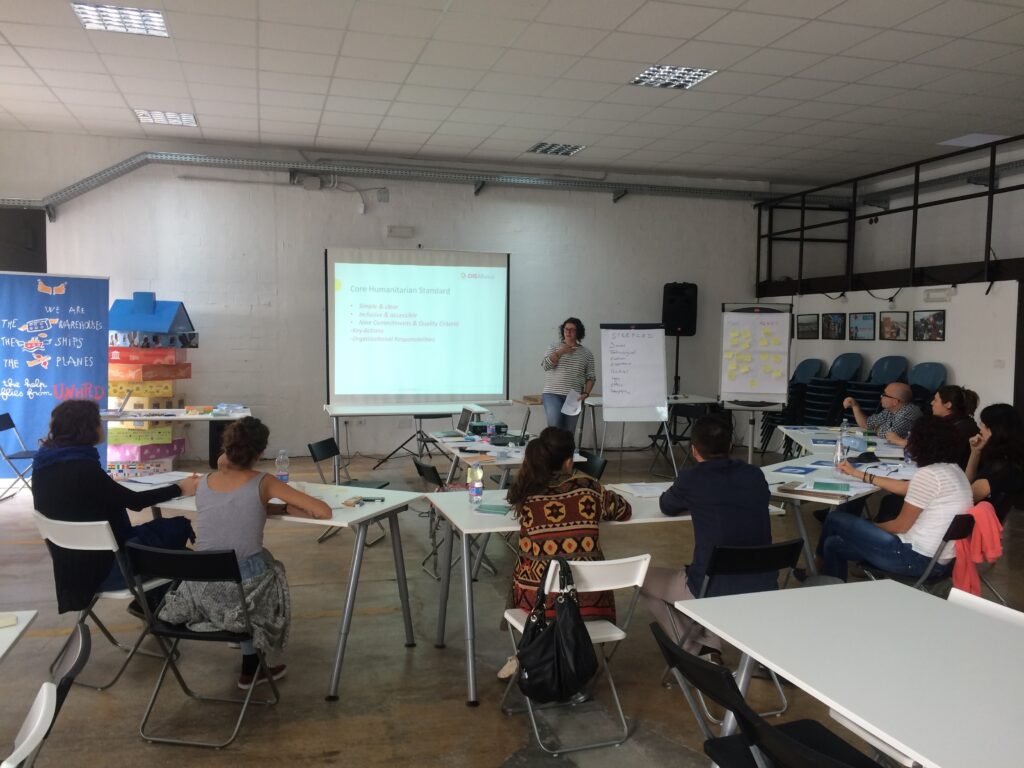Emmanuelle Lacroix | 22 Settembre 2015
I attended the “Tales from the humanitarian frontline” event at ODI to mark the World Humanitarian Day. Panel members were asked what drove them into aid work, and we were reminded of an old saying that aid workers would have been one of the three M’s: a mercenary, a missionary or a misfit. This got me thinking about another important M – member. As times have changed, so has the humanitarian and development sector and members are increasingly important.
Members of affected communities we work with and are accountable to make up around 90% of the workforce of humanitarian and development agencies – agencies that themselves are members of what is now a more professional sector where partnership and collaborative working underpin most of the strategic and operational work.
To unpack this further, I will focus on staff members. Misfits or not, aid workers are central to the mission on any agency, local or international – I think we all agree on that. Whether it is a career decision, a calling or a mix of both, this sector attracts and employs a considerable amount of dedicated individuals. And many of them come from affected communities that were and will remain in “the field”, because it also happens to be their home.
Most if not all agencies experience challenges around recruitment and retention: a limited talent pool, growing needs, ethical issues around using unpaid interns to do “real work”, a career ladder that seems to miss a few steps between entry roles and management jobs. Building on its innovative nature, the sector is working hard responding to these talent needs and initiatives such as ELRHA help bring the academic world to the table to address this issue from all angles.
Immense progress has been made to ensure good people management is part of agencies’ ways of working. This was first influenced and guided by the People In Aid Code, which has since been replaced with the Core Humanitarian Standard, amongst others.
I was reminded throughout the panel discussion of the importance of inspiring and courageous leadership, of contextualised and consistent capacity building and of taking duty of care seriously. All of these issues are important to the CHS Alliance for supporting good people management and accountability.
For all of these key areas of good people management to be meaningful and lead to quality and aid effectiveness, it has to reach all staff. A major shift (in the right direction) within our sector over the last decade has been the recognition that staff means all staff (national and expatriate) and that the differences between how national and expatriate staff are managed and supported must be addressed.
Many initiatives have started to move in this direction. Take for example the work done around management and leadership development, capacity building projects and competencies within individual agencies and with consortium work and joint initiatives such as the ECB project, the Start Network and the HLA to name but a few.
More must be done though – one difference between national and expatriate staff that has been hitting the headlines recently is around security and well-being. The continuous rise in casualties amongst aid workers is a fact we are all too aware of especially today, World Humanitarian Day, as we recognise and remember these aid workers that lost their lives whilst bringing relief to those most in need. Many of them are national staff. Whether it is as part of our security protocols (including evacuation plans) or well-being package, we must continue to work collaboratively and creatively to provide appropriate support and effective risks mitigation. This is non-negotiable.
Staff care is high on the CHS Alliance’s agenda: we made a submission to the World Humanitarian Summit (WHS) and supported a petition to have staff welfare as a key topic next year. We also held a conference on sexual violence in London on 3 September and will continue to work with key partners (within and outside the sector) to help organisations strengthen their approach to staff care.
It is also important to think about the systems and standards in place to support this. As the sector has become more professional, the innovation, drive and can-do attitude that has characterised it for so long is sometimes seen as diminished. At a time of growing needs and greater operational complexity, it is more than ever crucial to foster this humanitarian spirit that believes that “everything is possible” when communities are in need whilst ensuring we – as individuals and organisations – behave and operate within agreed standards and systems to ensure quality and effectiveness.
This is how we can have greater impact, reach greater numbers and ensure a smooth transition between relief and longer term development whilst gaining the understanding and support of all (communities, donors, public and other sectors). And ultimately how we can achieve the humanitarian objectives whilst valuing the individuals working hard to make humanitarian ideals a reality.
Find out more about World Humanitarian Day here. Share your stories on Twitter with hashtag#ShareHumanity.

